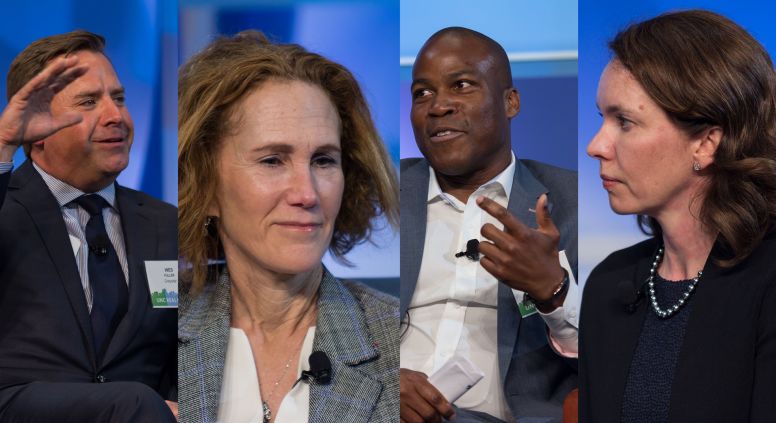News & Stories
Human capital and the bottom line

Attracting talent is a priority for the real estate industry. Real estate veterans sat down to discuss the importance of human capital and, specifically, diversity in their companies at the annual UNC Real Estate Conference hosted by the Leonard W. Wood Center for Real Estate Studies at UNC Kenan-Flagler.
Kelly Nagel (MBA ’08), a regional vice president at Aimco Apartment Homes, moderated the panel with Lawrence Braithwaite, senior vice president of portfolio management at ASB Real Estate Investments; Gayle Starr, managing director of capital markets at Prologis; and Wes Fuller, executive managing director of investment management at Greystar.
Panelists shared what they have done to recruit diverse talent. Starr explained that the pool of diverse candidates is small because for a long time there was no pipeline for underrepresented groups. To combat this issue, her company’s initiative has been to feed the pipeline by funding scholarships, offering internships and planning outreach programs for young women.
Fuller shared a similar sentiment. Companies want to hire the most qualified candidate, so if a company wants more qualified diverse candidates, it needs to create opportunities where more people can gain the qualifications needed. Changing the recruitment model for Greystar by offering internships and more early experiences has helped to fill the pipeline and, in turn, given the company more candidates to choose from.
Fuller recognized the scope of the diversity problem in real estate when Greystar was fundraising with pension funds and institutional capital six years ago. “We realized really early on that we’re not representative of the stakeholders of our investors as an employee base,” said Fuller.
When it comes to gender diversity, at first glance, Greystar seems to have a fairly equal balance of male and female employees, but the problem presents itself when looking at individual business units. Investment management is only made up of 23 percent women, but property management is majority women. This is a problem many companies face and requires a focus on those unbalanced business units in addition to diversity as a whole in the company.
The importance of inclusion when building a diverse workforce was discussed. Recruiting a diverse workforce is challenging, but creating an environment where all employees feel they belong and are valued is equally as challenging. Braithwaite believes the best way to accomplish inclusion is to simply listen to employees. Everyone wants to be heard, so is there a forum where employees can voice their opinions or are employees empowered to form task forces?
At Greystar, the path to a more diverse and inclusive workspace began with female employees who were empowered to bring up the issue and start a dialogue. Fuller emphasized there is no one thing that you can change to instantly improve diversity and there is no set endpoint when it comes to tackling the problem. There will always be room for improving diversity and inclusion in the workplace.
One step all panelists’ companies have focused on when trying to improve their workplaces is to offer better benefits and specifically more maternal and paternal leave. “People think about [parental leave] as a cost, but I think we’re going to find that it’s a huge benefit,” said Fuller. He explained when employees take time off, it allows other members of their team to step up and show their potential. In the long run these policies create stronger teams and boost morale.
Braithwaite summed up the panelist’s sentiments into one sentence. “If you think policies are too expensive, mediocre employees are more expensive.”
By Kelly McNeil (BSBA ’19)